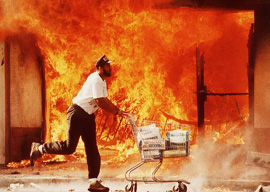
August 11, 2011

Buildings and cars burning, mobs looting, outnumbered police incapable of restoring order—London in 2011. As I watch the news on television and the spilling of civil unrest into other cities, The Clash’s London Calling is running through my head. But I have seen this particular apocalypse before, right here on the streets of Hollywood during 1992’s Rodney King riots. As in that earlier time and place the current excitement in Britain is attributed to black and other minority rage at perceived police brutality. In this case, it’s the shooting of Mark Duggan; in our situation it was the beating of Rodney King. Of course, King survived his ordeal, addressing the television audience during the height of the riots and plaintively asking, “can we all get along?” He has since become an odd sort of city mascot, trotted out by the media on various occasions and always getting coverage during his recurring scrapes with the law.
In both cities, shops were torched and some venerable establishments given up to plunder and flame—the House of Reeves in Croydon, for example, and Frederick’s of Hollywood here. So far, four people have lost their lives in Britain, far less than 1992’s death toll of 53. To quell the Los Angeles riots, it was necessary to call in the National Guard—what our Commonwealth cousins would call “aid to the civil power.” In LA, the arrival of tanks had the desired effect.
Another example of the power of force in dealing with rioters was seen in LA’s Koreatown. Because of the Koreans’ recent immigrant status and swift economic rise, many blacks resented them—rioters often targeted their properties for destruction. But the Koreans didn’t yield as easily as Anglo-Americans. Many hired Korean ex-soldiers to protect their shops or offices. Authorities condemned the practice as “taking the law into their own hands”—but all such properties guarded by tough-looking, rifle-toting Korean GIs were unmolested. Although the British often look down their noses at the omnipresence of guns in the US, perhaps things would be different in Croydon had Mr. Reeves been able to employ such folk.
Eventually, order will be restored and sooner or later the damage repaired. The London rioters will discover what ours did—burn out your neighborhood stores and you will find it hard to eat in the following days without turning for help to the “oppressors.” But the mental scars will probably last longer. Part of the reason is that Britain has been a fundamentally more civil society than California. This has changed radically in the past five decades, but the cultural memory is strong. Moreover, when you are as self-absorbed as we Angelenos tend to be, disasters fade in the mind quickly—then again, we have so many of them. After our riots in 1992, there followed a chain of natural disasters, leading comedians to joke that “in LA we do indeed have four seasons: earthquake, riot, fire, and flood.” But Londoners and those of other affected cities will be pondering—and reacting—to this affair long after the equivalent was virtually forgotten in LA.